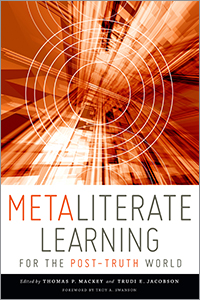Primary tabs
You don't need to be an ALA Member to purchase from the ALA Store, but you'll be asked to create an online account/profile during the checkout to proceed. This Web Account is for both Members and non-Members.
If you are Tax-Exempt, please verify that your account is currently set up as exempt before placing your order, as our new fulfillment center will need current documentation. Learn how to verify here.
- Description
- Table of Contents
- About the authors
- Reviews
Foreword by Troy A. Swanson
Metaliteracy, Jacobson and Mackey’s revolutionary framework for information literacy, is especially well suited as a tool for ensuring that learners can successfully navigate the proliferation of fake news, questionable content, and outright denialism of facts in today’s information morass. Indeed, it is starkly evident that the competencies, knowledge, and personal attributes specific to metaliterate individuals are critical; digital literacy and traditional conceptions of information literacy are insufficient for the significant challenges we currently face. This book examines the newest version of the Metaliteracy Goals and Learning Objectives, including the four domains of metaliterate learning, as well as the relationship between metaliteracy and the ACRL Framework for Information Literacy for Higher Education. Featuring contributions from a variety of information literacy instructors, educators, librarians, and faculty, the chapters in this book
- discuss the social, political, and ethical dimensions of information creation, distribution, and use;
- use case studies to demonstrate how metaliteracy guides learners to read online information with a critical eye, apply metacognitive thinking to the consumption of all information, and make purposeful and responsible contributions to the social media ecosystem as active participants;
- examine when images are taken out of context and paired with misleading text, a prevalent feature of the misinformation frequently shared via social media; and
- situates metaliteracy in such contexts such as the academic library, a science class, fiction writing, digital storytelling, and a theater arts course.
Metaliteracy is a powerful model for preparing learners to be responsible participants in today’s divisive information environment, and this book showcases several teaching and learning practices that have already proven effective.
List of Figures and Tables
Foreword, by Troy A. Swanson
Preface
Acknowledgments
1 Empowering Metaliterate Learners for the Post-Truth World
Thomas P. Mackey
2 The Materiality of Metaliteracy: A Documentary Approach and Perspective for Information and Literacy Practices in the Post-Truth Era
Marc Kosciejew
3 Inoculation Theory and the Metaliterate Learner
Josh Compton
4 Constructing Scientific Literacy through Metaliteracy: Implications for Learning in a Post-Truth World
Allison B. Brungard and Kristin Klucevsek
5 When Stories and Pictures Lie Together—and You Do Not Even Know It
Thomas Palmer
6 Teaching and Learning with Metaliterate LIS Professionals
Nicole A. Cooke and Rachel M. Magee
7 First, Help Students Learn to Be Wrong
Allison Hosier
8 Fictional Affect and Metaliterate Learning through Genre
Jaclyn Partyka
9 Poetic Ethnography and Metaliteracy: Empowering Voices in a Hybrid Theater Arts Course
Kimmika L. H. Williams-Witherspoon
About the Editors and Contributors
Index
Thomas P. Mackey
Thomas P. Mackey, Ph.D., is Professor of Arts and Media in the School of Arts and Humanities at State University of New York (SUNY) Empire State College. His research into metaliteracy, a pedagogical framework he originated with Prof. Trudi E. Jacobson develops learners as reflective, informed, and self-directed producers of information. They both lead the Metaliteracy Learning Collaborative to advance metaliteracy research, writing, teaching, grant projects, open educational resources (OER), and the design of innovative learning environments. He and Prof. Jacobson have both been invited to keynote on metaliteracy in the United States and internationally. They provide updates on their research through their collaborative blog at metaliteracy.org. Prof. Mackey served as Associate Dean and Dean of the Center for Distance Learning (CDL), and in senior management roles as Vice Provost for Academic Programs and Interim Provost. He teaches courses in History & Theory of New Media, Information Design, Digital Storytelling, and Ethics of Digital Art & Design and has developed several international Massive Open Online Courses (MOOCs) about metaliteracy. His faculty website is: https://www.tpmackey.com/.
Trudi E. Jacobson
Trudi E. Jacobson, MLS, MA, Distinguished Librarian, was the Head of the Information Literacy Department at the University at Albany for many years, retiring in 2022. In 2021, she was appointed an Extraordinary Professor in the Self-Directed Learning Research Unit of the Faculty of Education, North-West University in Potchefstroom, South Africa. She has been deeply involved with teaching and information literacy throughout her career, and from 2013–2015 cochaired the Association of College and Research Libraries Task Force that created the Framework for Information Literacy for Higher Education. With Prof. Thomas P. Mackey, she codeveloped metaliteracy. Her most recent work focuses on open pedagogy and how the students’ learning experience can be enhanced in such settings by metaliteracy. She regularly teaches an information literacy course for upper-level undergraduates that uses editing in Wikipedia as a way to understand core concepts from metaliteracy and information literacy, as well as an information literacy instruction graduate course, and has taught a first-year experience course in which students created an OER for other first-year students (https://sites.google.com/view/ualbanyforfirstyearstudents/home). She is the coauthor or coeditor of fourteen books, including three about metaliteracy, and numerous scholarly articles and book chapters. Prof. Jacobson received the ACRL Miriam Dudley Instruction Librarian Award in 2009. Her website is http://www.trudijacobson.com.
"A solid addition to academic libraries, particularly those with doctoral programs.”
— Library Journal
"Especially relevant and timely ... This book is recommended for library schools as well as academic libraries.”
— Technical Services Quarterly



